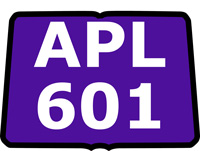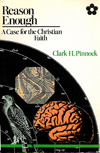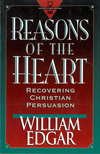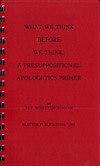Description
APL 601 – Introduction to Christian Apologetics
APL 601-Introduction to Christian Apologetics, a 5 credit hour course of studies in the Masters programs of Reformation International Theological Seminary.
Course Description: 5 credit hours.
This course is a study of the principles, method, and content of Christian apologetics. Christian apologetics is an intellectual defense of the faith which includes a positive intellectual reason for the Christian faith vindicated in the face of other world and life views. The focus is on presuppositional apologetics, as compared to evidential apologetics. This course should prepare the student for the next Apologetics course, “Applied Apologetics.”
Required Materials for the Course (see below for more information and purchase)
APL 601- Course Payment – Introduction to Christian Apologetics (5 credit hours)
This covers the tuition payment for this 5 credit hour course.
TEXTBOOKS (Required): In the textbooks that follow, various positions are set forth and it is the purpose of this course to interact with them all by letting the various presenters of positions that differ to greater or lesser degree with each other, speak for themselves. But also to demonstrate through the lectures, the superiority of the presuppositional apologetic approach because of its greater consistency with the Bible as the only authoritative approach.
Christian Apologetics (by Cornelius Van Til) Van Til is arguably the most important apologist of the 20th Century and this book is the single best point of entry into all of his writings. In this book Van Til presents the underpinnings of his uniquely biblical approach. He shows how Christian apologetics is rooted in a unified system of scriptural truths, a worldview that encompasses all spheres of knowledge. Noting the ultimate conflict between Christian and non-Christian systems, Van Til sets forth a method of argument that centers on an all-important, biblically defined point of contact with the unbeliever. In this particular edition, William Edgar sheds light on Van Til’s approach by adding a new introduction and explanatory notes.
Defense of the Faith (by Cornelius Van Til) This new annotated edition of Van Til’s The Defense of the Faith restores the full text of the original work in a form that is more easily understood without abridgement but with added clarification. This edition contains a forward and explanatory notes by K. Scott Oliphint, which will help the reader grasp a method of apologetics consistent with the nature of Christianity itself and continually relevant to our time.
What We Think Before We Think: A Presuppositional Apologetics Primer (by Robert Grossman) This textbook is essentially the outline notes in published form of the lectures by the author used in this course. Dr. Grossman was a student of Van Til’s “presuppositional” approach to apologetics. Presuppositions in apologetics are those things “What we think before we think”, and thus the title of the book. He is highly supportive but also critical of Van Til and has designed his book to make this intellectual approach to apologetics accessible to a broad range of Reformed Christians.
Classical Reading in Christian Apologetics (by Russ L. Bush) This volume is a collection of selected readings that are of continuing significance for Christian apologetics. Dr. Bush has written a general introduction to the field of apologetics and an introduction to each apologist cited and the work or works from which selections have been drawn. A brief bibliography is also given for each writer. Christians have always been called on to defend their beliefs–certainly no less today than at any other time in history. In this book the outstanding apologists of previous centuries become models, both in the content of their writing and in their methodology, for Christians today. All those who love the Lord and His church and are concerned that many be made aware of the reasonableness of the Christian faith will find this book enlightening and exciting. The readings considered in this book are by Justin Martyr (A.D. 100-167); Athenagoras (2nd Century); Irenaeus (AD 120-203); Tertullian (AD 155-235); Origen (c. AD 185-c. 253); Athanasius (c. AD 298-373); Augustine of Hippo (AD 354-430); Anselm of Canterbury (AD 1033-1109); Thomas Aquinas (AD 1225-1274); John Calvin (AD 1509-1564); Joseph Butler (AD 1692-1752); and William Paley (AD 1743-1805).
Reason Enough (by Clark Pinnock) Is there any reason to believe in the Christian message? Is there reason enough? Encouraging both faith and critical judgment, Clark Pinnock investigates the truth claims of the Christian message in the light of five circles of evidence. Pragmatic (Does the gospel give life meaning?); Experiential (Is religious experience credible?); Cosmic (Do the heavens really declare the glory of God?); Historical (Did the Son of God actually come to earth?); Corporate (Does Christian faith change lives?). Every open-minded, inquisitive person should check out the Christian faith for themselves. Here is a good place to start.
The God Who Is There (by Francis Schaeffer) If you want to understand your world, The God Who Is There is the place to bvegin. We are constantly bombarded with conflicting ideas about God, religions and what our future holds. Where did these views come from? Where are they going? How do we put them together? Francis Schaeffer offers us the secure moorings of the Word of God and the unchanging Lord who has always been there to give us his truth and his love. Schaeffer shows how historic Christianity fearlessly challenges the competing philosophies of the world. If fully applied, Schaeffer contends, such a Christianity could solve the deepest problems of our modern world.
TEXTBOOKS (Recommended) These textbooks contain required reading in them, but RITS provides these readings along with the lectures at no additional cost. The required reading from these books is in PDF form or at locations where they can be read on-line, but not downloadable or printable. However, the lectures make reference continually to other areas from these books even though not required. The books are excellent and highly recommended for your library.
Jerusalem and Athens (by E. R. Geehan) The symposium in this book is composed of essays which edal, more or less directly, with the problems and issues raised and discussed in the apologetics of Cornelius Van Til. A basic, non-philosophical introduction to his own thought is embodied in a preliminary essay from his own pen, entitled “My Credo”. The impact of the book is sharpened by Van Til’s rsponse to those essays which he felt necessitated a reply. (Some of these are required reading in this course, others are referred to and very helpful in obtaining an even greater understanding of the subject.)
By What Standard (by R. J. Rushdoony) Basic to this study is the belief that presuppositions of human thought in every field must be basically one in order to arrive at any concept which both validates biblical faith and human knowledge. The sovereignty of the self-contained God is the key to every field, in that only the God of Scripture makes all things possible and explicable and is thus the basic premise not only of theology, but of philsoophy, science and indeed all knowledge. In that God is the Creator of all things, He is their only valid principle of interpretation, in that they derive both their existence and meaning from His creative act. This belief is herein set forth in terms of various aspects of human thought. Again basic to this study is the belief that such a philosophy finds consistent and able exposition in the writings of Cornelius Van Til. This work, therefore, is thus both an exposition as well of Van Til’s development of that philosoophy, a school of thought to which the author subscribes.
LECTURES: Lectures (39), lecture transcripts and selected required readings (DOWNLOADABLE VERSION audio MP3). The lectures are by Prof. Robert Grossman.
The audio lectures are in an MP3 format and are available by download.





Reviews
There are no reviews yet.